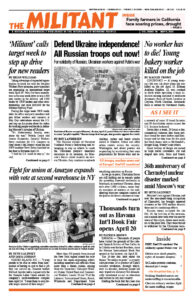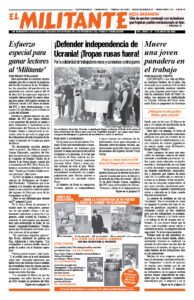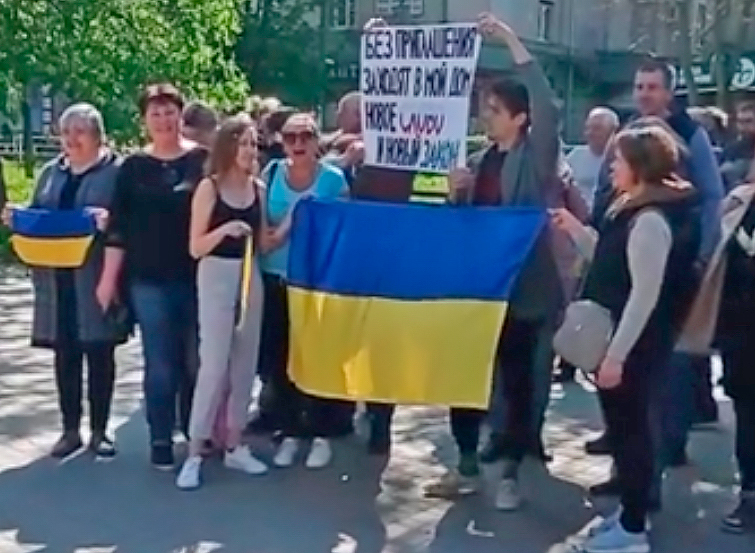The Russian regime of President Vladimir Putin is redirecting and attempting to step up efforts to crush the Ukrainian people’s tenacious resistance to its invasion. As Moscow’s forces center assaults on eastern Ukraine, they continue to unleash shelling, rocket and bomb attacks aimed at Kharkiv, Odesa and other urban centers across the country. Washington and allied powers are responding by accelerating their own preparations for future wars and intensifying sanctions on Russia.
As we go to press, Ukrainian forces are still holding out in tunnels under the sprawling Azovstal steelworks in Mariupol, in southeast Ukraine, along with over 1,000 civilians, many family members of workers at the mill, denying Moscow complete control of the port as its forces continue to bombard the area.
Putin’s goal is to conquer Ukraine, crush its independence and advance the Russian rulers’ efforts to reimpose their domination of neighboring countries, formerly oppressed under the czarist empire’s prison house of nations and under Stalin.
“The Socialist Workers Party calls for the defeat of Moscow’s invasion of Ukraine and withdrawal of every one of its troops,” Naomi Craine, SWP candidate for governor of Illinois, said April 25. “We are for Ukraine independence. At the same time, we demand the withdrawal of all U.S. troops and nuclear weapons from Europe and an end to Washington’s brutal sanctions on Russia, sanctions that — regardless of their ‘target’ — hit working people the hardest.”
Some 200,000 workers in Moscow alone, mainly in industrial and retail jobs, are about to be thrown out of work.
Top officials from Washington visited Kyiv, the capital, April 24 to meet Ukrainian President Volodymyr Zelensky, the first such meeting since the war began. Secretary of Defense Lloyd Austin and Secretary of State Antony Blinken promised to supply Zelensky’s government, which represents the country’s capitalist rulers, with heavier and more long-range armaments and to return U.S. diplomats to Ukraine. In Austin’s words, Washington’s goal is for the war to leave Russia “weakened.”
The German government now says it will send anti-aircraft cannons to Ukraine. Putin’s invasion has shaken up capitalist rulers across the globe, touching off new searches for allies and a massive arms race, as each regime seeks a road to defend its economic and military interests.
The Russian rulers’ war is just the latest reflection of capitalism’s unavoidable march toward ever more deadly conflicts. This largest land war in Europe in decades shows once again that the U.S. rulers’ judgment that they won the Cold War when the Soviet Union collapsed was mistaken. Instead of reinforcing their dominance and providing stability to pursue their predatory interests, the end of the Cold War highlighted Washington’s declining strength and gave rise to sharper competition and conflicts among capitalist powers.
Acting under the illusion they could impose their will as they saw fit, the U.S. imperialists waged wars in Iraq in 1990, Yugoslavia in the late 1990s, Afghanistan beginning in 2001 and Iraq again in 2002, along with numerous other military interventions from Syria to Libya. Each had devastating consequences for working people at home and abroad, and none resulted in long-standing gains for Washington.
“There is only one social force that can end the threat of new and wider wars and the impact of the social and economic catastrophes being prepared by imperialism,” said Craine. “That is the working class, most importantly in the U.S., going into motion in its own class interests.
“As the working class grows in strength, combat experience and confidence, it can reach out the hand of solidarity to workers worldwide and seek common action that can take on wars like today’s invasion of Ukraine,” she said. “More and more we see the need to take state power out of the hands of the capitalist war makers. The SWP exists to advance that struggle.”
Russian forces have made little progress in battles to capture the Donbas region and more of the Black Sea coast after their efforts to seize Kyiv and other central Ukrainian cities were repulsed and their forces damaged.
Belarus rail workers help turn tide
Moscow’s intervention in Ukraine was meant to lead to the rapid capture of the capital. It relied on an extensive rail network for supplying and reinforcing Russian forces through Belarus, where President Viktor Lukashenko is allied with Putin.
But one problem was that hundreds of thousands of Belarusians had risen up in 2020 against the regime. Though their strikes and mass protests were brutally repressed and thousands arrested, opposition to Lukashenko and his backers in Moscow remains widespread.
A clandestine network was formed by railway workers, online hackers and others. They disabled railway links through Belarus, contributing to the holdup of Moscow’s supply lines of food, fuel and ammunition and buying time for Ukrainian forces to defend themselves. The clandestine group proudly drew inspiration from Belarusians who blew up train lines to disrupt Hitler’s march against the Soviet Union during World War II.
This meant Moscow’s invasion of Ukraine ground to a standstill, forced to rely on trucks to transport supplies, and facing determined Ukrainian resistance and increasingly low troop morale.
“We didn’t want to kill any Russian army or Belarusian train drivers,” Yury Ravavoi, a Belarusian trade unionist who was part of the network, told the Washington Post. He had escaped arrest in Belarus during the 2020 uprising against Lukashenko by fleeing to Poland. He said the group stopped trains by hacking computer systems and disabling electrical signaling and switching gear.
This was very easy to do, Yuliana Shemetovets, another member of the group, told the Post, because the Belarus rail company stills runs its computer network on outmoded Windows XP.
Protests by Russians against the war
Defying Putin’s arrest of protesters, individuals continue to find ways to show their opposition to the war. Artist Daria Apakhonchich was ruled a “foreign agent” by authorities in 2020 for her opposition to Putin. She used her compulsory quarterly report to the Russian Justice Ministry to protest Putin’s war. On the forms she has to fill out she drew pictures of the destruction of Ukrainian cities and the toll on civilians and on the soldiers of both sides and then posted the images online.
Russian “soldiers could refuse to fight. And many did,” she wrote. “Journalists could refuse to write lies. And many did.”
“Putin’s regime will end one day,” she wrote, “but we’ll live on — live and rebuild what is being destroyed now.”


